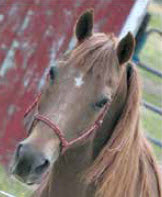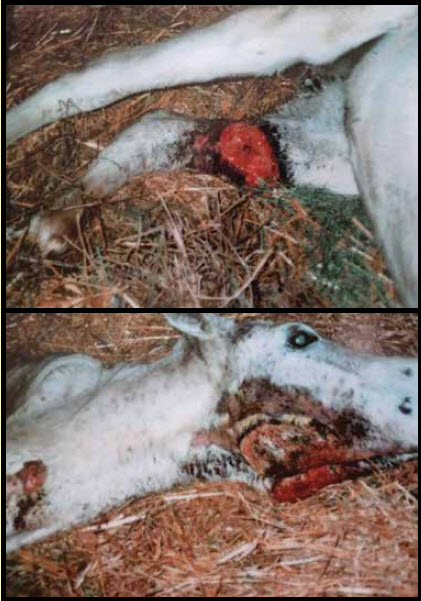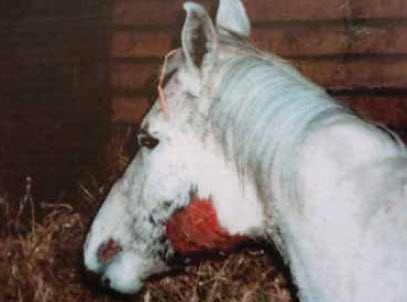 By: Deb Kitchenmaster
By: Deb Kitchenmaster
The tune for the month of June is “DARLING.”
I was called to a barn where a horse in dire need was rescued from a farm site nearby. Darling, a gray Arabian mare, with a desire for LIFE in her eyes like I had never seen before, was lying in a warm, clean stall, unable to move. Someone had put a halter on this horse and turned her out to pasture. The pasture was peppered with machinery that was unsafe for any horse with a halter strapped to its head. The land was covered with snow and quite cold temperatures showed on the thermometer. The horse got her head too close to one of these machines, and her halter hooked on a protruding part. Pulling as hard as she could, she could not free herself.
The people overseeing her care failed to check on the horse and were unaware of her trapped condition. The snow continued to fall and the temperatures continued to drop. The lack of water, hay, and shelter weakened this horse and she, herself, dropped to the ground with the halter clinging to an unmovable object that horsepower could not overcome. When she was discovered, she was barely alive and sections of her body were frozen to the ground. When they freed her from her enemy (the machine) and got her to her feet, there were sections of hair and hide that remained on the ground. People joined together and with the wisdom of a caring equine vet and the horse’s will to LIVE, Darling was nurtured back to LIFE. After recovering from her wounds, she was placed in a loving home, that made the day for two happy little girls.
Can you imagine the trauma trapped INSIDE this mare? Trauma is described as an injury (such as a wound) to living tissues caused by an extrinsic agent. Darling the horse, with the help of caring, loving people, came through this experience in her life. What about you? Did you know, we all have a DARLING inside of us? We do! It’s our soul. King David (in the Bible) referred to his soul as his darling.
Psalm 22:19-20 states, “But be not thou far from me, O LORD: O my strength, haste thee to help me. Deliver my soul from the sword; my DARLING from the power of the dog,” The word DARLING means only one, beloved, soul.

Some identifiable traits of trauma in humans are: startle response, shame, self-hatred, panic attacks, overwhelming emotion, chronic pain, headaches, eating disorders, substance abuse, self-destructive behaviors, little or no memories, depression, numbness, nightmares, and flashbacks. Horses with a history of trauma easily draw out the unresolved emotions and repressed memories of humans who have experienced trauma.
You might have met a horse that you were pretty sure did not have a brain, but that’s not true. However, the brain of the horse is different than a human’s brain.
The cortex (social/emotional control center), hippocampus (short term memory, cause-and-effect), and amygdala (flight, flight, freeze, faint) functions of the brain are alerted when traumatized. If you can’t fight or run away from a particularly painful or horrifying situation, some part of your awareness withdraws, anesthetizing strong sensations, and distorting time, perception and memory.
Anger and forgiveness are NOT opposing forces: they are completely equal partners in the true healing of one’s soul (Darling). Real forgiveness is a process that creates true separations from torment and tormentors; and true separations require the boundary-restoring energy of anger. Forgiveness naturally follows the honorable restoration of your sense of self. You no longer have abandoned YOU. You come home to being at peace with you; all of you, strength and weaknesses included.
My hope is that this true story of Darling would bring awareness to you regarding your soul. What does it profit a man (humanity) if he gains the whole world and loses his own soul (DARLING)? Lick and chew on what your darling is. Your DARLING is one, beloved, soul. Our DARLING consists of 7 functions. They are: consciousness, understanding, judgment, imagination, mind, memory, and will (the feet of our soul). Where we will go, we will. Where we will not, we won’t.







